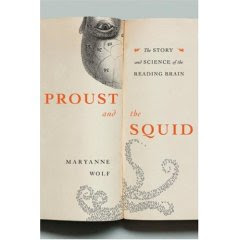
This looks interesting. Proust and the Squid: The Story and Science of the Reading Brain by Maryanne Wolf, released yesterday. How do our minds learn to read? Is reading a relatively new (a few thousand years old) skill? Cognitive neuroscientist Wolf thinks so.
From the book description:
The act of reading is a miracle. Every new reader's brain possesses the extraordinary capacity to rearrange itself beyond its original abilities in order to understand written symbols. But how does the brain learn to read? As world-renowned cognitive neuroscientist and scholar of reading Maryanne Wolf explains in this impassioned book, we taught our brain to read only a few thousand years ago, and in the process changed the intellectual evolution of our species.
Wolf tells us that the brain that examined tiny clay tablets in the cuneiform script of the Sumerians is configured differently from the brain that reads alphabets or of one literate in today's technology.
There are critical implications to such an evolving brain. Just as writing reduced the need for memory, the proliferation of information and the particular requirements of digital culture may short-circuit some of written language's unique contributions—with potentially profound consequences for our future.
It would appear from the description that we have adapted our original wiring to learn how to make sense of written symbols, that reading was something of an evolutionary process. If so, what happens to that wiring when someone has dyslexia? And is our reading limited by our brain's ability (or lack thereof) to adapt written symbols into understanding? (Man, does this mean I'll never be able to understand Faulkner?)
I'm also very interested in what Wolf has to say about how technology has influenced in the short term (and will influence in the long term) our ability to read. This looks like a must-read. (If my cognitive abilities will permit it, that is.)
2 comments:
No, you won't ever be able to understand Faulkner, but it has nothing to do with evolution.
Maybe, but I think one more dose of The Sound and the Fury and I'd regress to a state of gelatinousness.
Post a Comment